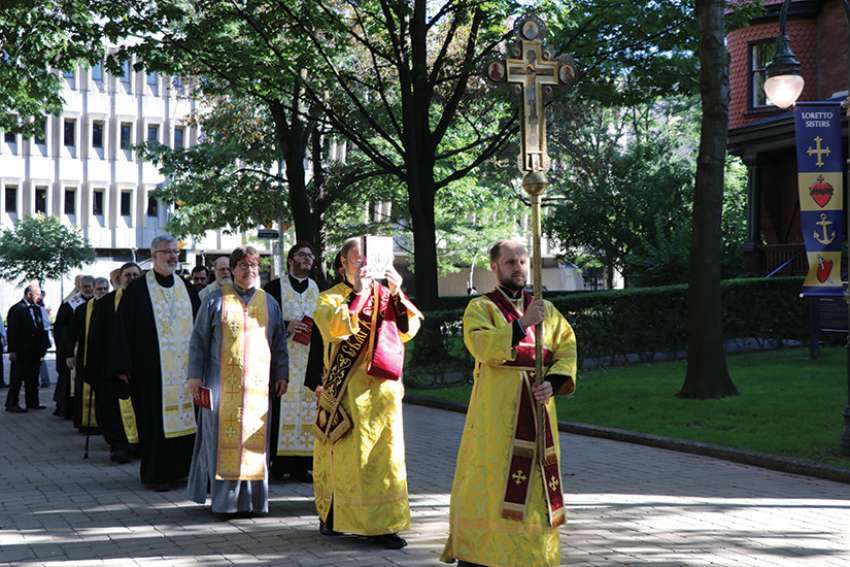A procession begins the July 25 welcoming ceremony at the University of St. Michael’s College for the Sheptytsky Institute of Eastern Christian Studies.
Photo courtesy St. Michael’s College.
Sheptytsky Institute grounded in freedom
By Michael Swan, The Catholic Register
It should surprise no one that at a time of rising authoritarianism, democracy will be on the curriculum when the Sheptytsky Institute reopens in Toronto.
Along with teaching liturgy, Church history and systematic theology, professors at the institute’s new home in the University of Toronto’s St. Michael’s College are also preparing democracy lessons. And that makes perfect sense to those who know how the Eastern rite Ukrainian Catholic Church was forced underground by Stalinist Soviet rule between 1946 and 1989, said Borys Gudziak, Eparch of the Ukrainian Greek Catholic Eparchy of Paris.
“What the Ukrainian Catholic Church became an expert at — an unwilling expert — was how to stand up to authoritarianism and totalitarianism,” he said.
About 500 people attended an official blessing and garden party July 25 to welcome the Sheptytsky Institute to Toronto. Founded at Chicago’s Catholic Theological Union in 1986, the institute moved to Ottawa’s Saint Paul University in 1990.
The arrival at St. Michael’s College on July 1 makes Sheptytsky part of the ecumenical Toronto School of Theology, which comprises three Catholic graduate faculties, plus theological faculties from two wings of the Anglican tradition, the United Church of Canada and Presbyterians. TST also maintains academic ties with Orthodox, Mennonite, Jewish and Muslim scholars and programs.
Master of Divinity and Master of Arts degrees from Sheptytsky will now be awarded conjointly with the University of Toronto through St. Michael’s College and the Toronto School of Theology.
“I founded the institute to help the rebirth of our Church in North America,” said the school’s founding scholar Right Rev. Dr. Andriy Chirovsky.
In the dying days of the Soviet empire, Chirovsky imagined that a healthy, theologically grounded Ukrainian Catholic tradition in democratic North America would be necessary if and when Ukrainians ever escaped Communist totalitarian rule and embraced democracy.
“Our mission really hasn’t changed that much. We’re focused on North America,” Chirovsky said. “We are today a global Church.”
The Ukrainian Catholic Major Archbishop of Kyiv — equivalent to a patriarch for the Greco-Catholic Ukrainians — Sviatoslav Shevchuk is an alumnus of Sheptytsky. From its base in the Ukrainian Byzantine tradition, the Sheptytsky Institute maintains interest and academic ties to Orthodox, Coptic, Assyrian and Catholic traditions, Chirovsky said.
But it’s the institute’s instinct for democratic culture in a world where two-thirds of the Earth’s population has little or no freedom that makes it unique, said Gudziak.
“What the Sheptytsky Institute is bringing forward is an understanding of how (the Venerable Andrey) Sheptytsky and his Church was able to meet the greatest challenges of the 20th century,” said Gudziak, president of the Ukrainian Catholic University in Kyiv, Ukraine. “Today there is, globally, an increase in authoritarian rule … Whether it’s for Christians of the Middle East, or Christians in the former Soviet Union, or Christians in the Far East, whether it’s people of good will in many countries and contexts today — the issue of human dignity, of human freedom, is foremost.”
Please support The Catholic Register
Unlike many media companies, The Catholic Register has never charged readers for access to the news and information on our website. We want to keep our award-winning journalism as widely available as possible. But we need your help.
For more than 125 years, The Register has been a trusted source of faith-based journalism. By making even a small donation you help ensure our future as an important voice in the Catholic Church. If you support the mission of Catholic journalism, please donate today. Thank you.
DONATE

